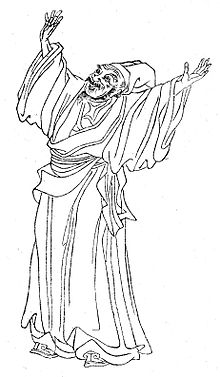You can help expand this article with text translated from the corresponding article in Chinese. (May 2023) Click [show] for important translation instructions.
Content in this edit is translated from the existing Chinese Wikipedia article at [[:zh:柳宗元]]; see its history for attribution.{{Translated|zh|柳宗元}} to the talk page. |
Liu Zongyuan (Chinese: 柳宗元; pinyin: Liǔ Zōngyuán; 773 – 28 November 819) was a Chinese philosopher, poet, and politician who lived during the Tang dynasty. Liu was born in present-day Yongji, Shanxi. Along with Han Yu, he was a founder of the Classical Prose Movement. He has been traditionally classed as one of the "Eight Great Prose Masters of the Tang and Song".
Liu Zongyuan
柳宗元 | |
|---|---|
 | |
| Born | 773 |
| Died | November 28, 819(819-11-28) (aged 45–46) |
| Nationality | Chinese |
| Occupation(s) | Philosopher, poet, politician |
| Liu Zongyuan | |||||||||||||||||||||||||||
|---|---|---|---|---|---|---|---|---|---|---|---|---|---|---|---|---|---|---|---|---|---|---|---|---|---|---|---|
| Chinese | 柳宗元 | ||||||||||||||||||||||||||
| |||||||||||||||||||||||||||
| Courtesy name | |||||||||||||||||||||||||||
| Chinese | 子厚 | ||||||||||||||||||||||||||
| |||||||||||||||||||||||||||
Liu Zongyuan was born in 773.[1] His courtesy name was Zihou (子厚).
Liu Zongyuan's civil service career was initially successful; however, in 805, he fell out of favour with the imperial government because of his association with a failed reformist movement. He was exiled first to Yongzhou, Hunan, and then to Liuzhou, Guangxi, where he eventually became the city Governor. A park and temple in Liuzhou is dedicated to his memory.[2] His exile allowed his literary career to flourish: he produced poems, fables, reflective travelogues and essays synthesizing elements of Confucianism, Taoism and Buddhism.
He died in 819.[1]
Liu's best-known travel pieces are the Eight Records of Excursions in Yongzhou (永州八記). Around 180 of his poems are extant, of which five were collected in the anthology Three Hundred Tang Poems. Some of his works celebrate his freedom from office, while others mourn his banishment.
One of his most famous poems is "Jiangxue" (江雪), translated into English as "River Snow" or "Winter Snow". The poem has been an inspiration for many works of Chinese painting.
|
A thousand mountains, but no sign of birds in flight; |
Liu Zongyuan wrote Fei Guoyu (simplified Chinese: 非国语; traditional Chinese: 非國語, Argument against the Harangues of the Various States), a criticism of Guoyu. In response, Liu Zhang (劉 章, c. 1095–1177); Jiang Duanli (simplified Chinese: 江端礼; traditional Chinese: 江端禮); and Yu Pan (Chinese: 虞槃 fl. 1300), Yu Ji's (虞 集, 1272–1348) younger brother, wrote texts titled Fei Fei Guoyu (simplified Chinese: 非非国语; traditional Chinese: 非非國語; Argument against the Argument against the Harangues of the Various States) in opposition to Liu Zongyuan's essay.[3]